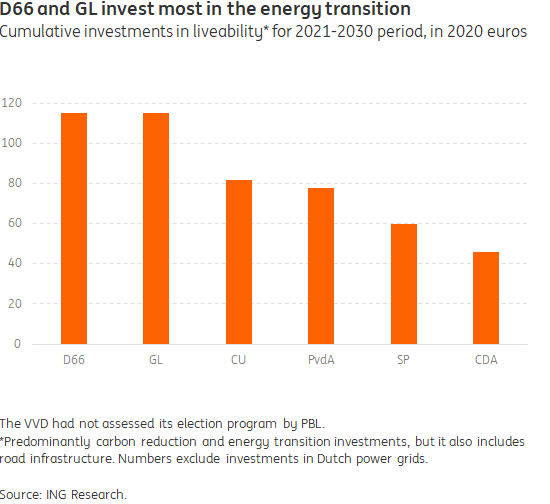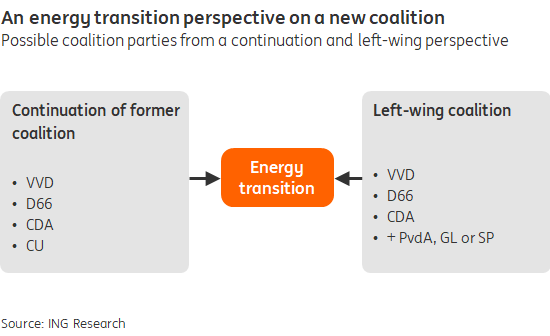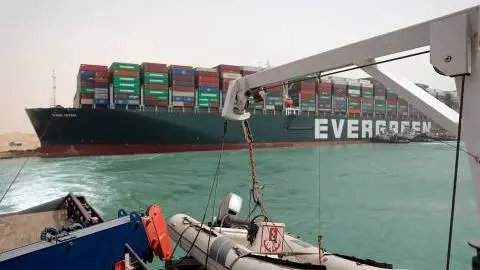Dutch election result could boost energy transition
Ruling liberal parties VVD and D66 are big winners in the Dutch election. This may have important consequences for climate and energy policies going forward. D66 is now the second largest party. It is expected to seek a higher 2030 carbon emissions reduction target, pushing for more offshore wind, hydrogen and national carbon pricing
D66 is expected to bring climate change and energy transition to the negotiating table
With all votes counted, VVD remains the largest party, but D66 is now the second largest party. This is likely to speed up energy transition plans in the Netherlands as the election manifesto of D66, together with the green progressive left party GroenLinks (GL), proposes higher levels of investment in this area than other parties, according to an assessment by the Dutch Environmental Planning Agency.

We explore the likely consequences for major climate and energy transition policies with a more left-wing coalition at the helm. In doing so, we focus on the general policy direction, rather than the specifics of the many parties that could form a coalition.

2030 climate goal is likely to be raised
The Dutch Climate Agreement currently opts for an emission reduction target of 49%. This target is expected to be raised to at least 55% to bring it in line with the recently increased EU-target. The election programmes of VVD, CDA and CU do not signal any plans to go beyond 55%, as this would cause serious carbon leakage within the EU-ETS system. This stands in sharp contrast to the EU-orientated D66 and the more left-wing parties like PvdA, SP and GL, which point to higher reduction targets of close to 60%. These parties seem to value a rapid greening of the Dutch economy over carbon leakage that would limit the effectiveness of stricter national climate policies.
National policies on top of the European carbon trading scheme
Views on policy instruments differ, too. VVD has a stronger focus on European policies such as limiting free allowances within EU-ETS and extending the ETS-system towards other sectors such as transportation and the built environment. While D66 and many left-wing parties support these measures, they also stress the importance of additional national policies. D66, for example, wants to add 10 euros to the EU carbon price for large Dutch manufacturers this year, and the amount increases towards 2030. Under a left-wing coalition, climate and energy policies are likely to have a stronger national focus. The proposition for an EU carbon border tax can be found in the election programmes of both the former coalition (VVD and D66) and more left-wing parties such as PvdA.
Renewables, renewables, renewables
The Dutch Climate Agreement is already ambitious on solar and wind energy. New heavy weight D66 is likely to set the bar even higher. In its election programme, the party aims for the tendering of an astonishing 60 GW of offshore wind in the next 10 years to be operational before 2040, the equivalent of circa 6,000 wind turbines. That stands in sharp contrast to the current offshore capacity of 2.5 GW and the 2030 target of 11.5 GW in the Climate Agreement. It is likely that this ambition will come down in a coalition with CDA and CU, which have strong support in the fishing industry. Alternatively, an agreement may be struck to allow fishermen to fish between the windmills using new techniques.
All parties prefer offshore wind over onshore wind, and rooftop solar over large solar farms. Large scale solar farms on agricultural land, and on inland waters (floating solar) will be a discussion point, even among left-wing parties. D66 is not against these projects but other parties (GL, CDA and PvdA) want to preserve the landscape as much as possible, for example by obliging real estate owners to install solar panels on their rooftops (GL).
Biomass can set talks on fire
Views on the use of biomass differ widely. CDA is the only party that wants to continue to invest in biomass from sustainable sources. That is not surprising as CDA has strong support among farmers who are active in energy production from biomass. However, the party probably needs to compromise as both VVD and D66 want to stop subsidies for new biomass projects. Biomass could be a lightning rod for disagreement when left-wing parties enter coalition talks. Most of them explicitly mention the phasing out of existing biomass support schemes. This is also linked to the parties' positions on coal-fired power plants in which most of the biomass is co-fired. Currently, the four remaining coal-fired power plants need to close before 2030. Left-wing parties want to close them sooner, whereas VVD, CDA and CU stick to the current policy in their election manifestos.
Expect investment in hydrogen…
Hydrogen is the one thing that all the major parties agree on as being a building block of the Dutch energy transition. They all want to create a hydrogen hub in the Netherlands to support the energy transition in manufacturing, the power sector, the built environment and transportation, both domestically and internationally. Views differ on the electricity source for the production of hydrogen. According to VVD, D66 and CDA, nuclear power could play a role in the future production of hydrogen, while this is a no go for CU and the left-wing parties.
…and carbon capture and storage
There seems to be more support for Carbon and Capture Storage (CCS) compared to the last formation in 2017. VVD, D66 and CDA view it as a necessity to reach the emission reduction targets and climate goals, especially in manufacturing. Left-wing parties have shown strong opposition in the past, but now they, too, view it as a necessary though temporary technology. This is further supported by a common understanding that the Netherlands has the knowledge and infrastructure to excel in CCS.
Expect renewed interest in nuclear energy, but no major investment decisions
Nuclear power is a controversial topic in the Netherlands. The VVD put the topic on the political agenda in the run up to the elections as it views nuclear power as a necessity to reach the climate goals. The Christian Democrats (CDA) do, too. However, the CU and all left-wing parties are against it. In light of this, the view of ‘new heavy weight’ D66 could be crucial, although the party seems to be ambivalent towards nuclear power. On the one hand, D66 allows market players to apply for permits to build nuclear power plants. On the other, they have no interest in subsidising nuclear power, which is a prerequisite for market participants to be able to build a viable business case and apply for a permit.
These differences might be bridged early on in the debate as many steps are still required before an investment decision can be made. Think of research and political debate on possible locations, whether it is wise to build nuclear power plants near the coastline in times of climate change and rising sea levels, the viability of the business case, how to finance multi-billion investments and how to organise local support. Such research and debate is likely to outlive the lifespan of the new coalition.
This publication has been prepared by ING solely for information purposes irrespective of a particular user's means, financial situation or investment objectives. The information does not constitute investment recommendation, and nor is it investment, legal or tax advice or an offer or solicitation to purchase or sell any financial instrument. Read more
Download
Download article
23 March 2021
Night boat to Cairo This bundle contains 10 Articles